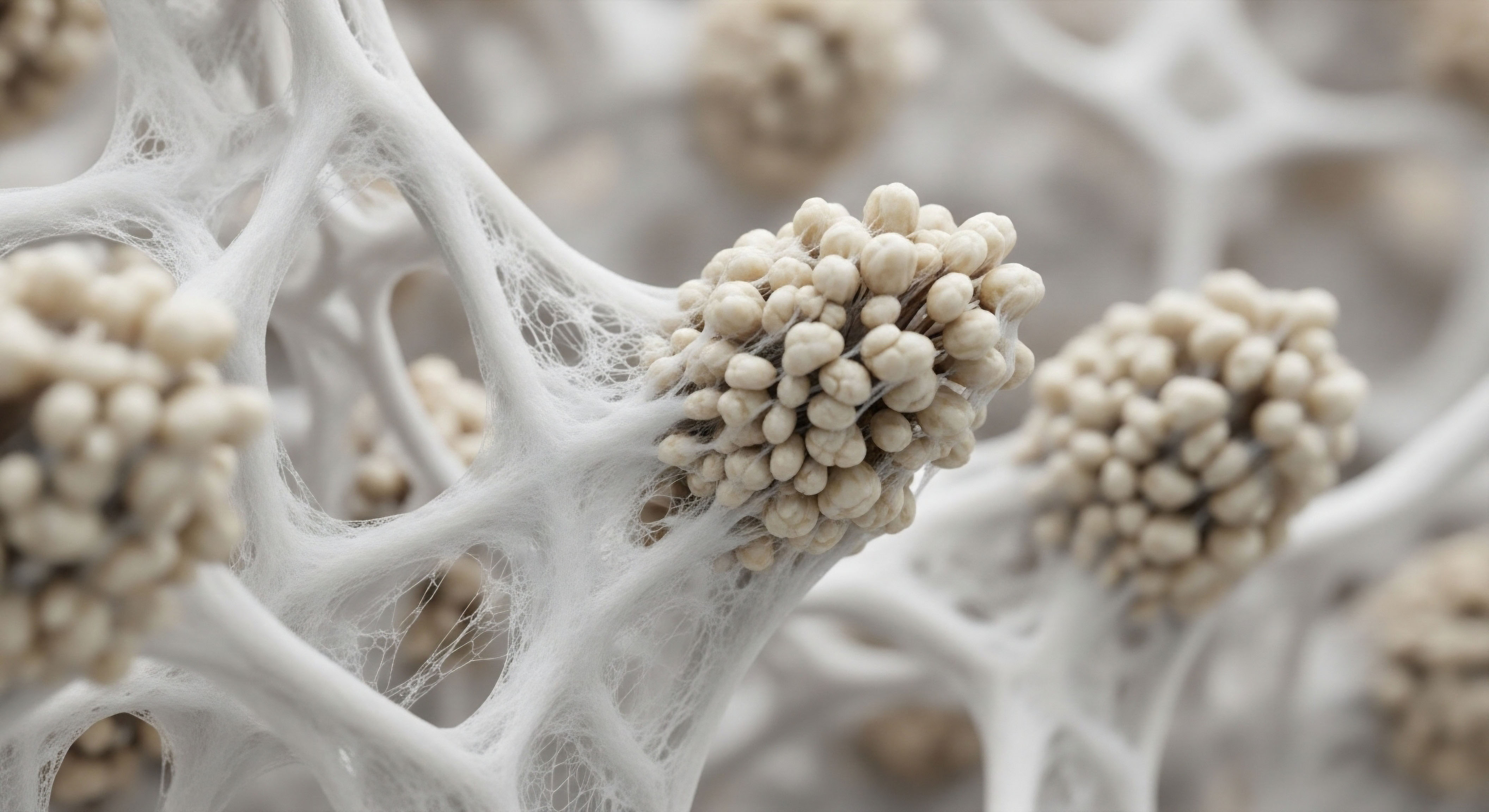

Fundamentals
Perhaps you have noticed a subtle shift, a fleeting moment where a familiar name escapes you, or a general haziness clouds your thoughts. These experiences, often dismissed as typical signs of aging or daily stress, can feel disorienting. They might leave you wondering if your cognitive sharpness is slowly diminishing.
This feeling of being slightly off, of not quite operating at your peak mental capacity, is a deeply personal concern. It prompts a desire to understand the underlying mechanisms at play within your own biological systems. This journey into understanding is not about accepting decline; it is about reclaiming vitality and function without compromise.
Your body functions as an intricate network of communication, with chemical messengers constantly relaying instructions. Among these messengers, hormones play a particularly significant role, acting as the body’s internal signaling system. They regulate nearly every physiological process, from metabolism and mood to sleep cycles and cognitive performance. When this delicate hormonal balance is disrupted, the repercussions can extend far beyond what many initially perceive, influencing the very architecture and function of your brain.
The brain, a highly active organ, depends on a stable internal environment to operate optimally. Hormones contribute to this stability by influencing neuronal growth, synaptic plasticity, and neurotransmitter synthesis. A consistent supply of specific hormones helps maintain the structural integrity and functional efficiency of brain cells. Disruptions in these hormonal signals can compromise the brain’s ability to adapt and repair itself, potentially setting the stage for long-term vulnerabilities.
Hormonal balance is essential for maintaining optimal brain function and protecting against cognitive decline.

Hormonal Messengers and Brain Health
Several key hormonal systems directly influence brain health and cognitive resilience. The sex hormones, such as estrogen and testosterone, are not solely involved in reproductive functions. They exert widespread effects throughout the central nervous system. Estrogen, for instance, supports neuronal survival, enhances synaptic connections, and modulates neurotransmitter systems like serotonin and dopamine. Its presence helps maintain brain energy metabolism and protect against oxidative stress.
Testosterone, similarly, plays a vital role in cognitive function for both men and women. It influences spatial memory, verbal fluency, and overall mental acuity. Adequate testosterone levels contribute to neurogenesis, the creation of new brain cells, and support the health of existing neurons. When these sex hormone levels decline, as they naturally do with age or due to other factors, the brain’s protective mechanisms can weaken, potentially increasing susceptibility to neurodegenerative processes.
Beyond sex hormones, the thyroid hormones are fundamental regulators of brain development and function. They influence metabolic rate in brain cells, impacting energy production and neurotransmitter activity. An underactive thyroid, or hypothyroidism, can manifest as brain fog, memory issues, and slowed cognitive processing. Conversely, an overactive thyroid can lead to anxiety and cognitive agitation. Maintaining optimal thyroid function is therefore a cornerstone of neurological well-being.
The body’s stress response system, governed by the hypothalamic-pituitary-adrenal (HPA) axis, also profoundly impacts brain health. Cortisol, the primary stress hormone, is vital for short-term adaptation. Prolonged elevation of cortisol, however, can damage hippocampal neurons, a brain region critical for memory and learning. Chronic stress, leading to sustained high cortisol, can shrink brain volume and impair cognitive flexibility, making the brain more vulnerable to age-related changes.

Understanding Hormonal Communication
Hormones operate through a sophisticated feedback system, much like a home thermostat. When a particular hormone level drops below a set point, the brain signals the relevant endocrine gland to produce more. Once levels return to normal, the brain reduces the signal, maintaining equilibrium. This delicate balance can be disrupted by various factors, including chronic stress, poor nutrition, environmental toxins, and the natural aging process.
Consider the hypothalamic-pituitary-gonadal (HPG) axis, which regulates sex hormone production. The hypothalamus releases gonadotropin-releasing hormone (GnRH), which prompts the pituitary gland to release luteinizing hormone (LH) and follicle-stimulating hormone (FSH). These, in turn, stimulate the gonads (testes in men, ovaries in women) to produce testosterone and estrogen. Disruptions at any point in this axis can lead to imbalances that affect not only reproductive health but also cognitive vitality.
When these intricate communication pathways falter, the brain experiences a cascade of effects. Neurons may become less efficient at transmitting signals, cellular repair mechanisms can slow, and the brain’s overall resilience against stressors diminishes. Recognizing these early signs and understanding their hormonal underpinnings represents a proactive step toward preserving cognitive function and overall well-being.


Intermediate
The recognition that hormonal shifts can influence cognitive health leads naturally to considering targeted interventions. Personalized wellness protocols aim to recalibrate the body’s biochemical systems, addressing specific hormonal deficiencies or imbalances that contribute to neurodegenerative risk. These protocols are not merely about symptom management; they seek to restore optimal physiological function, thereby supporting brain health and overall vitality.
Hormonal optimization protocols often involve the careful administration of bioidentical hormones or specific peptides designed to stimulate endogenous production. The selection of a particular protocol depends on an individual’s unique hormonal profile, symptoms, and health objectives. This approach moves beyond a one-size-fits-all mentality, prioritizing a precise and tailored strategy for each person.

Testosterone Optimization for Men
For men experiencing symptoms associated with declining testosterone levels, such as cognitive fogginess, reduced mental sharpness, and diminished drive, Testosterone Replacement Therapy (TRT) can be a valuable intervention. The standard protocol often involves weekly intramuscular injections of Testosterone Cypionate (200mg/ml). This method ensures a consistent and stable supply of the hormone, helping to restore physiological levels.
To maintain the body’s natural testosterone production and preserve fertility, Gonadorelin is frequently included. This peptide is administered via subcutaneous injections, typically twice weekly. Gonadorelin stimulates the pituitary gland to release LH and FSH, thereby supporting testicular function. Another important component is Anastrozole, an oral tablet taken twice weekly.
Anastrozole acts as an aromatase inhibitor, blocking the conversion of testosterone into estrogen. This helps mitigate potential side effects associated with elevated estrogen levels, such as fluid retention or gynecomastia, which can also have subtle cognitive impacts. In some cases, Enclomiphene may be added to further support LH and FSH levels, particularly when fertility preservation is a primary concern.
Testosterone optimization in men aims to restore cognitive clarity and vitality by balancing key hormonal pathways.

Hormonal Balance for Women
Women navigating the complexities of pre-menopausal, peri-menopausal, and post-menopausal transitions often experience a range of symptoms, including irregular cycles, mood fluctuations, hot flashes, and diminished cognitive function. Targeted hormonal support can address these concerns. Testosterone Cypionate is also utilized for women, typically at much lower doses, around 10 ∞ 20 units (0.1 ∞ 0.2ml) weekly via subcutaneous injection. This low-dose approach can significantly improve libido, energy levels, and cognitive sharpness without inducing masculinizing effects.
Progesterone is prescribed based on menopausal status, playing a critical role in balancing estrogen and supporting mood, sleep, and brain health. For some women, Pellet Therapy offers a long-acting testosterone delivery method, where small pellets are inserted subcutaneously, providing a steady release of the hormone over several months. Anastrozole may be included when appropriate, particularly if estrogen levels become elevated due to testosterone conversion, ensuring a balanced hormonal environment.
These precise applications of hormonal support aim to mitigate the cognitive and systemic impacts of declining hormone levels, supporting neuronal health and overall well-being during significant life transitions.

Post-TRT and Fertility Protocols for Men
For men who have discontinued TRT or are actively trying to conceive, a specific protocol helps restore natural hormone production and fertility. This typically involves a combination of agents:
- Gonadorelin ∞ Continues to stimulate the pituitary-gonadal axis, encouraging endogenous testosterone production.
- Tamoxifen ∞ A selective estrogen receptor modulator (SERM) that blocks estrogen’s negative feedback on the pituitary, thereby increasing LH and FSH release.
- Clomid ∞ Another SERM, similar to Tamoxifen, which also stimulates LH and FSH production, promoting natural testosterone synthesis.
- Anastrozole ∞ Optionally included to manage estrogen levels during the recovery phase, preventing excessive estrogen conversion as natural testosterone production resumes.
This comprehensive approach helps the body regain its natural hormonal rhythm, which is important for overall systemic balance, including cognitive function.

Growth Hormone Peptide Therapy
Beyond traditional hormone replacement, peptide therapies offer another avenue for optimizing physiological function and supporting longevity, with indirect benefits for cognitive health. These peptides stimulate the body’s own production of growth hormone, which declines with age. Growth hormone plays a role in cellular repair, metabolic regulation, and tissue regeneration, all of which contribute to a healthier environment for brain function.
Key peptides in this category include:
- Sermorelin ∞ A growth hormone-releasing hormone (GHRH) analog that stimulates the pituitary to release growth hormone.
- Ipamorelin / CJC-1295 ∞ These peptides work synergistically to increase growth hormone secretion, promoting muscle gain, fat loss, and improved sleep quality.
- Tesamorelin ∞ A GHRH analog specifically approved for reducing visceral fat, which is linked to metabolic health and cognitive decline.
- Hexarelin ∞ A growth hormone secretagogue that also has potential benefits for cardiovascular health and tissue repair.
- MK-677 ∞ An oral growth hormone secretagogue that increases growth hormone and IGF-1 levels.
By supporting healthy growth hormone levels, these peptides contribute to a more robust metabolic state, reduced inflammation, and enhanced cellular repair, all factors that indirectly support neuroprotection.

Other Targeted Peptides
Specific peptides address particular aspects of health that can influence overall well-being and cognitive function:
PT-141, also known as Bremelanotide, is a peptide used for sexual health. It acts on melanocortin receptors in the brain to influence sexual desire and arousal. While its primary application is sexual function, a healthy sexual life contributes to overall quality of life and can indirectly support mental well-being.
Pentadeca Arginate (PDA) is a peptide being explored for its roles in tissue repair, healing, and inflammation modulation. Chronic inflammation is a significant contributor to neurodegenerative processes. By supporting the body’s natural healing mechanisms and reducing systemic inflammation, PDA could offer indirect neuroprotective benefits, creating a more favorable environment for brain health.
These targeted protocols represent a sophisticated approach to wellness, recognizing the interconnectedness of hormonal systems and their widespread influence on the body, including the delicate balance required for optimal brain function.


Academic
The intricate relationship between hormonal regulation and neurodegenerative risk extends to the molecular and cellular levels, involving complex feedback loops and metabolic pathways. Understanding these deep endocrinological connections reveals how seemingly disparate symptoms of cognitive decline can trace back to systemic hormonal dysregulation. The brain is not merely a passive recipient of hormonal signals; it actively participates in their synthesis, metabolism, and receptor expression, creating a dynamic interplay that dictates neuronal resilience.
Consider the pervasive influence of the hypothalamic-pituitary-gonadal (HPG) axis on brain aging. Sex steroid hormones, particularly estradiol and testosterone, are potent neurosteroids, meaning they are synthesized within the brain itself and exert direct effects on neuronal function. Estradiol, for instance, enhances synaptic plasticity in the hippocampus and cortex, regions critical for memory and executive function.
It modulates the expression of genes involved in neuronal survival and reduces oxidative stress by influencing mitochondrial function. A decline in estradiol, as observed during perimenopause and post-menopause, correlates with reduced cerebral glucose metabolism and increased amyloid-beta deposition, a hallmark of Alzheimer’s pathology.
Testosterone, in both sexes, supports neuronal integrity by promoting myelin synthesis and protecting against excitotoxicity. It influences the expression of brain-derived neurotrophic factor (BDNF), a protein vital for neuronal growth and survival. Low testosterone levels are associated with reduced gray matter volume in memory-related brain regions and an increased risk of cognitive impairment.
The interplay between these hormones and their respective receptors (estrogen receptors alpha and beta, androgen receptors) within specific neuronal populations dictates their neuroprotective or neurodegenerative potential.
Neurodegenerative risk is profoundly influenced by the intricate interplay of hormonal axes, metabolic pathways, and cellular resilience.

Metabolic Dysfunction and Neuroinflammation
Hormonal imbalances frequently coincide with metabolic dysfunction, creating a synergistic pathway toward neurodegeneration. Insulin resistance, a core component of metabolic syndrome, is not confined to peripheral tissues. The brain itself can become insulin resistant, impairing glucose uptake and utilization by neurons.
This state, sometimes termed “Type 3 Diabetes,” starves brain cells of their primary energy source, leading to mitochondrial dysfunction and increased oxidative stress. Hormones like cortisol, when chronically elevated, exacerbate insulin resistance and contribute to systemic inflammation, which directly impacts brain health.
Neuroinflammation, a persistent inflammatory response within the brain, is a significant driver of neurodegenerative diseases. Microglia, the brain’s resident immune cells, become overactive in response to chronic inflammation, releasing pro-inflammatory cytokines that damage neurons. Hormones play a regulatory role in this inflammatory cascade. For example, optimal levels of thyroid hormones and sex hormones can modulate microglial activity and reduce inflammatory signaling. Conversely, deficiencies can tip the balance towards a pro-inflammatory state.
The gut-brain axis also plays a role, with gut dysbiosis influencing systemic inflammation and the production of neurotoxic metabolites. Hormones like thyroid hormones and sex hormones influence gut microbiome composition and integrity, thereby indirectly affecting neuroinflammation.

The HPA Axis and Cognitive Vulnerability
The hypothalamic-pituitary-adrenal (HPA) axis, the body’s central stress response system, has a profound and often detrimental impact on long-term cognitive health when dysregulated. Chronic psychological or physiological stress leads to sustained activation of the HPA axis, resulting in prolonged elevation of glucocorticoids, primarily cortisol. While acute cortisol surges are adaptive, chronic exposure can be neurotoxic.
The hippocampus, a brain region critical for memory formation and spatial navigation, possesses a high density of glucocorticoid receptors. Sustained cortisol exposure can lead to dendritic atrophy, reduced neurogenesis, and impaired synaptic plasticity in the hippocampus. This structural and functional compromise contributes to memory deficits and increased vulnerability to neurodegenerative pathologies. Furthermore, chronic stress-induced HPA axis dysregulation can alter neurotransmitter systems, including serotonin, dopamine, and norepinephrine, which are vital for mood regulation, attention, and cognitive flexibility.
How do hormonal imbalances contribute to the progression of neurodegenerative conditions?
| Hormone Imbalance | Associated Neurodegenerative Mechanism | Potential Cognitive Impact |
|---|---|---|
| Low Testosterone (Men/Women) | Reduced neurogenesis, impaired myelin synthesis, increased amyloid-beta accumulation. | Memory decline, reduced spatial cognition, decreased verbal fluency. |
| Low Estradiol (Women) | Decreased cerebral glucose metabolism, increased oxidative stress, impaired synaptic plasticity. | Brain fog, memory issues, reduced executive function. |
| Chronic High Cortisol | Hippocampal atrophy, impaired neurogenesis, neurotransmitter dysregulation. | Memory impairment, mood disturbances, reduced cognitive flexibility. |
| Hypothyroidism | Reduced brain energy metabolism, impaired neurotransmitter synthesis, demyelination. | Slowed thinking, memory loss, poor concentration. |

Neurotransmitter Function and Hormonal Influence
Hormones directly influence the synthesis, release, and reuptake of neurotransmitters, the chemical messengers of the brain. For example, sex hormones modulate the serotonergic and dopaminergic systems, which are critical for mood, motivation, and reward. Declining estrogen levels in women can lead to reduced serotonin activity, contributing to mood disturbances and cognitive changes often seen in perimenopause. Similarly, testosterone influences dopamine pathways, affecting motivation and cognitive drive.
Growth hormone and its downstream mediator, Insulin-like Growth Factor 1 (IGF-1), also play a significant role in neuronal health. IGF-1 is a potent neurotrophic factor, supporting neuronal survival, dendritic arborization, and synaptic function. It also modulates glucose metabolism in the brain. Age-related decline in growth hormone and IGF-1 can impair these neuroprotective mechanisms, making neurons more susceptible to damage and contributing to cognitive decline. Peptide therapies, by stimulating endogenous growth hormone release, aim to restore these vital neurotrophic signals.
The intricate web of hormonal signaling, metabolic regulation, and neurotransmitter balance underscores the systemic nature of neurodegenerative risk. Addressing hormonal imbalances through personalized protocols represents a proactive strategy to support brain resilience and preserve cognitive function throughout life. This approach recognizes that the brain’s health is inextricably linked to the body’s overall biochemical harmony.
| Peptide | Mechanism of Action | Cognitive Relevance |
|---|---|---|
| Sermorelin | Stimulates pituitary GHRH receptors, increasing endogenous GH release. | Supports cellular repair, metabolic health, and sleep quality, indirectly benefiting brain energy. |
| Ipamorelin / CJC-1295 | Synergistically increases GH secretion, promoting lean mass and fat reduction. | Improved metabolic health reduces neuroinflammation and supports neuronal glucose uptake. |
| Tesamorelin | GHRH analog, specifically reduces visceral adipose tissue. | Reduced visceral fat lowers systemic inflammation, a risk factor for cognitive decline. |
| MK-677 | Oral GH secretagogue, increases GH and IGF-1 levels. | Elevated IGF-1 acts as a neurotrophic factor, supporting neuronal survival and plasticity. |

References
- Maki, Pauline M. and Victor W. Henderson. “Estrogen Replacement Therapy and Cognitive Function ∞ A Review of the Clinical and Preclinical Literature.” Journal of Clinical Endocrinology & Metabolism, vol. 92, no. 5, 2007, pp. 1623-1632.
- Moffat, Cynthia A. and Susan M. Resnick. “Longitudinal Changes in Cognition and Brain Volume in Middle-Aged and Older Men ∞ The Baltimore Longitudinal Study of Aging.” Neurobiology of Aging, vol. 30, no. 12, 2009, pp. 1922-1930.
- Lupien, Sonia J. et al. “Effects of Stress on Human Brain Structure and Function ∞ Implications for Psychiatric Disorders.” Dialogues in Clinical Neuroscience, vol. 18, no. 3, 2016, pp. 281-299.
- Davis, Susan R. et al. “Testosterone for Women ∞ The Clinical Practice Guideline of The Endocrine Society.” Journal of Clinical Endocrinology & Metabolism, vol. 101, no. 3, 2016, pp. 841-872.
- Bhasin, Shalender, et al. “Testosterone Therapy in Men With Hypogonadism ∞ An Endocrine Society Clinical Practice Guideline.” Journal of Clinical Endocrinology & Metabolism, vol. 103, no. 5, 2018, pp. 1715-1744.
- Koppes, Laura L. et al. “Thyroid Function and Cognitive Performance in Older Adults ∞ A Meta-Analysis.” Journal of Clinical Endocrinology & Metabolism, vol. 90, no. 12, 2005, pp. 6447-6453.
- Vance, Mary L. and Michael O. Thorner. “Growth Hormone-Releasing Peptides and Their Clinical Applications.” Journal of Clinical Endocrinology & Metabolism, vol. 84, no. 11, 1999, pp. 3859-3866.

Reflection
Recognizing the subtle shifts in your cognitive landscape is a powerful act of self-awareness. This exploration into hormonal health and its connection to neurodegenerative risk is not merely an academic exercise; it is an invitation to consider your own biological systems with renewed attention. The knowledge shared here serves as a starting point, a framework for understanding the intricate dance of hormones within your body and their profound influence on your brain.
Your personal health journey is unique, shaped by your genetics, lifestyle, and individual biochemical makeup. True vitality and sustained cognitive function often require a personalized approach, one that moves beyond generalized advice to address your specific needs. This understanding empowers you to engage in meaningful conversations about your health, seeking guidance that aligns with your body’s distinct requirements.
The path to reclaiming your cognitive sharpness and overall well-being is an ongoing process of discovery and recalibration. Armed with a deeper understanding of your internal systems, you hold the capacity to make informed choices that support your long-term health and vitality.



